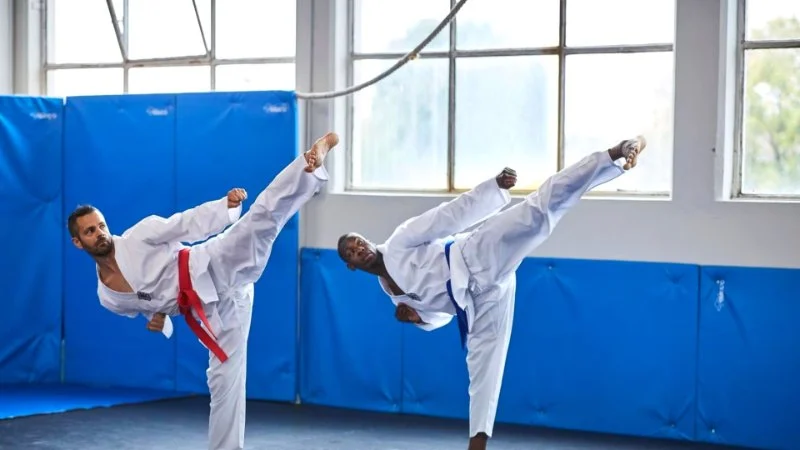
1. Why Tae Kwon Do Is Beneficial for Social Workers
Social workers often face high levels of stress and emotional strain in their line of work. With the demands of helping individuals and families through tough circumstances, social workers must take care of their own mental and physical well-being. One effective way to manage stress, increase resilience, and set healthy boundaries is through Tae Kwon Do, a martial art that combines physical discipline with mental focus.
pgsqlCopy codePhysical and Mental Health Benefits
Tae Kwon Do offers both physical and mental health benefits that are especially valuable for social workers. The physical aspects of Tae Kwon Do improve cardiovascular health, strength, and flexibility, while the mental training promotes focus, discipline, and emotional control. This combination helps social workers deal with the emotional challenges of their job and builds resilience in the face of adversity.

SDSS Martial Arts of Newton / sdss martial arts of natick
NewtonMiddlesex CountyMassachusetts
739 Beacon St, Newton, MA 02459, USA
Stress Relief and Emotional Balance
For social workers, stress relief is crucial. Tae Kwon Do provides a structured way to release tension and regulate emotions. Regular practice can serve as an outlet for frustration and anxiety, helping social workers maintain emotional balance and better manage the challenging situations they encounter in their work.

Giroux Bros Martial Arts / giroux brothers
WilbrahamHampden CountyMassachusetts
2400 Boston Rd, Wilbraham, MA 01095, USA
2. Building Resilience Through Tae Kwon Do
Resilience is the ability to bounce back from setbacks, adapt to change, and remain focused in difficult circumstances. Social work requires this kind of emotional strength, especially when dealing with clients in crisis. Tae Kwon Do is an excellent tool for building this resilience because it teaches perseverance, self-confidence, and the ability to stay calm under pressure.
Developing Mental Toughness
In Tae Kwon Do, practitioners are often challenged to push through physical discomfort and mental obstacles. These experiences parallel the challenges social workers face when dealing with difficult cases. Tae Kwon Do teaches how to maintain focus and composure during stressful situations, which helps social workers become mentally tougher and more resilient in their personal and professional lives.
Building Confidence and Self-Efficacy
Confidence is essential for social workers, who often have to make important decisions with limited resources. By progressing through the ranks in Tae Kwon Do, social workers can build confidence in their abilities, which transfers to their professional work. Martial arts practice fosters a strong sense of self-efficacy, helping individuals believe in their capacity to handle challenges, both physically and mentally.
3. Setting Boundaries in Social Work with Tae Kwon Do
One of the key challenges in social work is setting and maintaining boundaries with clients. Without clear boundaries, social workers risk burnout and emotional exhaustion. Tae Kwon Do provides a unique framework for understanding and setting boundaries through its philosophy and training methods.
Respect and Discipline
Tae Kwon Do emphasizes respect for oneself and others. In martial arts, practitioners are taught to respect their teachers, peers, and opponents, creating a foundation for mutual respect in all relationships. For social workers, this respect can be applied to their professional interactions, ensuring that they establish clear, healthy boundaries with clients and colleagues.
Emotional and Physical Boundaries
Through the physical movements of Tae Kwon Do, practitioners learn to be aware of their bodies and recognize their physical limits. This awareness helps social workers understand when they are reaching their emotional or physical limits in the workplace, allowing them to set boundaries that prevent burnout and maintain their well-being.
4. Real-Life Examples of Social Workers Using Tae Kwon Do
Many social workers have found Tae Kwon Do to be an effective tool for maintaining balance in their personal and professional lives. For example, a social worker dealing with childhood trauma found that the physical discipline of Tae Kwon Do helped her cope with the emotional weight of her job. Through regular practice, she learned how to stay centered and grounded, even in the most challenging cases.
Another social worker, working in a high-stress environment with at-risk youth, used Tae Kwon Do as a way to teach her clients about discipline and self-control. This helped her connect with her clients on a deeper level while also building her own resilience. By incorporating the principles of Tae Kwon Do into her daily routine, she was able to set stronger boundaries with her clients and maintain a healthier work-life balance.
5. How to Get Started with Tae Kwon Do for Social Workers
If you’re a social worker looking to build resilience and set boundaries through Tae Kwon Do, getting started is easier than you might think. Here are some simple steps to begin your journey:
1. Find a Local Dojo
Look for a reputable Tae Kwon Do school (dojo) in your area that offers beginner-friendly classes. Many dojos offer introductory classes that are perfect for newcomers to martial arts. Be sure to ask about the class structure, what to expect, and any specific goals you may have as a social worker looking to incorporate Tae Kwon Do into your life.
2. Set Realistic Goals
Start with small, realistic goals for your training. It could be learning the basic stances or mastering a simple kata (form). As you progress, you can set more challenging goals, such as earning higher belts or learning advanced techniques. Setting goals will help you stay motivated and focused on the benefits of your practice.
3. Incorporate Tae Kwon Do Into Your Routine
To truly reap the benefits, practice regularly. Even just 20-30 minutes of practice a few times a week can have a significant impact on your mental and physical well-being. Consider integrating mindfulness and breathing exercises into your daily routine, similar to the meditation practices taught in Tae Kwon Do, to help manage stress in your professional life.
For those interested in getting started with Tae Kwon Do, visit Jeuns TKD Hub for the best resources, instructors, and equipment to help you build resilience and maintain boundaries in your social work career.




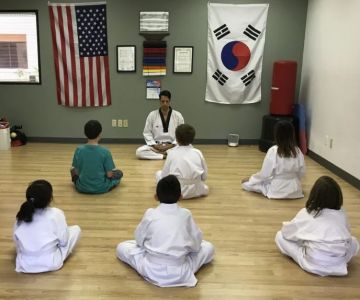

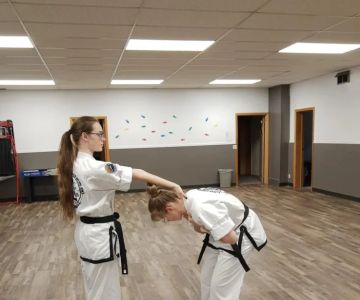
 Elite Martial Arts - Bellevue5.0 (17 reviews)
Elite Martial Arts - Bellevue5.0 (17 reviews) Five Rings Jiu Jitsu4.0 (61 reviews)
Five Rings Jiu Jitsu4.0 (61 reviews) Kenshokan Martial Arts4.0 (26 reviews)
Kenshokan Martial Arts4.0 (26 reviews)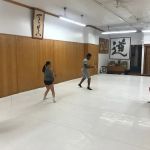 Chicago Balintawak Martial Arts5.0 (3 reviews)
Chicago Balintawak Martial Arts5.0 (3 reviews) Champions Martial Arts Kew Gardens5.0 (71 reviews)
Champions Martial Arts Kew Gardens5.0 (71 reviews) Master Cho's Talium4.0 (38 reviews)
Master Cho's Talium4.0 (38 reviews) How to Execute a Jumping Roundhouse Kick to the Head
How to Execute a Jumping Roundhouse Kick to the Head How to Execute a Double Kick Combination in Sparring
How to Execute a Double Kick Combination in Sparring How to Perform a Flawless Axe Kick: A Step-by-Step Guide
How to Perform a Flawless Axe Kick: A Step-by-Step Guide DIY Tae Kwon Do Training Equipment for Home Practice
DIY Tae Kwon Do Training Equipment for Home Practice How to Increase Your Vertical Jump for Tae Kwon Do Flying Kicks
How to Increase Your Vertical Jump for Tae Kwon Do Flying Kicks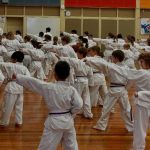 The History of the Tae Kwon Do Peace Corps
The History of the Tae Kwon Do Peace Corps